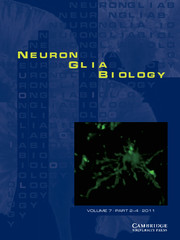Crossref Citations
This article has been cited by the following publications. This list is generated based on data provided by
Crossref.
Korz, Volker
and
Frey, Julietta U.
2005.
Bidirectional Modulation of Hippocampal Long-Term Potentiation under Stress and No-Stress Conditions in Basolateral Amygdala-Lesioned and Intact Rats.
The Journal of Neuroscience,
Vol. 25,
Issue. 32,
p.
7393.
Navakkode, Sheeja
Sajikumar, Sreedharan
and
Frey, Julietta Uta
2005.
Mitogen-Activated Protein Kinase-Mediated Reinforcement of Hippocampal Early Long-Term Depression by the Type IV-Specific Phosphodiesterase Inhibitor Rolipram and Its Effect on Synaptic Tagging.
The Journal of Neuroscience,
Vol. 25,
Issue. 46,
p.
10664.
Sajikumar, Sreedharan
Navakkode, Sheeja
Korz, Volker
and
Frey, Julietta U.
2007.
Cognitive and emotional information processing: protein synthesis and gene expression.
The Journal of Physiology,
Vol. 584,
Issue. 2,
p.
389.
Sajikumar, Sreedharan
Navakkode, Sheeja
and
Frey, Julietta U.
2007.
Identification of Compartment- and Process-Specific Molecules Required for “Synaptic Tagging” during Long-Term Potentiation and Long-Term Depression in Hippocampal CA1.
The Journal of Neuroscience,
Vol. 27,
Issue. 19,
p.
5068.
Korz, Volker
and
Frey, Julietta U.
2007.
Hormonal and monoamine signaling during reinforcement of hippocampal long-term potentiation and memory retrieval.
Learning & Memory,
Vol. 14,
Issue. 3,
p.
160.
Reymann, Klaus G.
and
Frey, Julietta U.
2007.
The late maintenance of hippocampal LTP: Requirements, phases, ‘synaptic tagging’, ‘late-associativity’ and implications.
Neuropharmacology,
Vol. 52,
Issue. 1,
p.
24.
Gruss, M.
Braun, K.
Frey, J.U.
and
Korz, V.
2008.
Maternal separation during a specific postnatal time window prevents reinforcement of hippocampal long-term potentiation in adolescent rats.
Neuroscience,
Vol. 152,
Issue. 1,
p.
1.
Frey, Sabine
and
Frey, Julietta U.
2008.
Essence of Memory.
Vol. 169,
Issue. ,
p.
117.
Schulz, Kristina
and
Korz, Volker
2010.
Emotional and cognitive information processing: Relations to behavioral performance and hippocampal long-term potentiation in vivo during a spatial water maze training in rats.
Learning & Memory,
Vol. 17,
Issue. 11,
p.
552.
Woldeit, M.L.
and
Korz, V.
2010.
Theta oscillations during holeboard training in rats: different learning strategies entail different context-dependent modulations in the hippocampus.
Neuroscience,
Vol. 165,
Issue. 3,
p.
642.
Tabassum, Heena
and
Frey, Julietta U.
2013.
The effect of acute swim stress and training in the water maze on hippocampal synaptic activity as well as plasticity in the dentate gyrus of freely moving rats: Revisiting swim-induced LTP reinforcement.
Hippocampus,
Vol. 23,
Issue. 12,
p.
1291.
Viola, Haydée
Ballarini, Fabricio
Martínez, María Cecilia
and
Moncada, Diego
2014.
Molecular Basis of Memory.
Vol. 122,
Issue. ,
p.
391.
Ziegler, Lorric
Zenke, Friedemann
Kastner, David B.
and
Gerstner, Wulfram
2015.
Synaptic Consolidation: From Synapses to Behavioral Modeling.
The Journal of Neuroscience,
Vol. 35,
Issue. 3,
p.
1319.
Bezu, Mekite
Maliković, Jovana
Kristofova, Martina
Engidawork, Ephrem
Höger, Harald
Lubec, Gert
and
Korz, Volker
2017.
Spatial Working Memory in Male Rats: Pre-Experience and Task Dependent Roles of Dopamine D1- and D2-Like Receptors.
Frontiers in Behavioral Neuroscience,
Vol. 11,
Issue. ,
Eschenko, Oxana
2018.
Handbook of in Vivo Neural Plasticity Techniques.
Vol. 28,
Issue. ,
p.
327.
Sampedro-Piquero, Patricia
Moreno-Fernández, Román D.
Mañas-Padilla, M. Carmen
Gil-Rodríguez, Sara
Gavito, Ana Luisa
Pavón, Francisco J.
Pedraza, Carmen
García-Fernández, María
Ladrón de Guevara-Miranda, David
Santín, Luis J.
and
Castilla-Ortega, Estela
2018.
Training memory without aversion: Appetitive hole-board spatial learning increases adult hippocampal neurogenesis.
Neurobiology of Learning and Memory,
Vol. 151,
Issue. ,
p.
35.
Vorobyov, Vasily
Medvinskaya, Natalia
Deev, Alexander
Sengpiel, Frank
Bobkova, Natalia
and
Lunin, Sergey
2020.
Spatial memory deficits initiated by agroclavine injection or olfactory bulbectomy in rats are characterized by different levels of long-term potentiation expression in the hippocampus.
International Journal of Neuroscience,
Vol. 130,
Issue. 12,
p.
1225.
Zhu, Hao
Chen, Aiguo
Guo, Wei
Zhu, Fengshu
and
Wang, Biye
2020.
Which Type of Exercise Is More Beneficial for Cognitive Function? A Meta-Analysis of the Effects of Open-Skill Exercise versus Closed-Skill Exercise among Children, Adults, and Elderly Populations.
Applied Sciences,
Vol. 10,
Issue. 8,
p.
2737.
Shi, Yifan
Cai, Kelong
Zhu, Hao
Dong, Xiaoxiao
Xiong, Xuan
Zhu, Lina
Sun, Zhiyuan
and
Chen, Aiguo
2021.
Football Juggling Learning Alters the Working Memory and White Matter Integrity in Early Adulthood: A Randomized Controlled Study.
Applied Sciences,
Vol. 11,
Issue. 9,
p.
3843.


